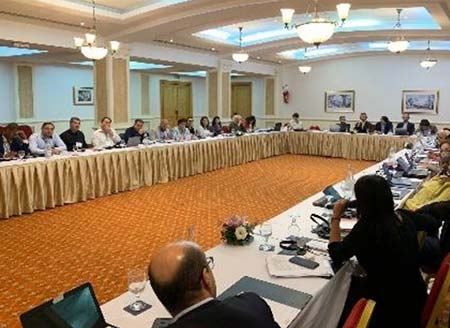Social media workshop in Tunis 2019
Date
21 - 22 October 2018
 On October 21st and 22nd 2019, OHCHR organized the first-ever regional workshop on enhancing civic space and addressing hate speech in social media in the Middle East and North Africa region. The workshop in Tunis was attended by 36 media workers, human rights defenders, social influencers and members of religious minorities.
On October 21st and 22nd 2019, OHCHR organized the first-ever regional workshop on enhancing civic space and addressing hate speech in social media in the Middle East and North Africa region. The workshop in Tunis was attended by 36 media workers, human rights defenders, social influencers and members of religious minorities.
It included 21 women and 15 men from Algeria, Bahrain, Egypt, Iran, Iraq, Jordan, Lebanon, Morocco, Saudi Arabia, Sudan, Syria, Tunisia, United Arab Emirates and Yemen.
Digital technology has transformed the means through which human rights are both exercised and unduly constrained.
The ability to access and use the Internet and social media platforms have been critical in the evolution of the ‘Arab Spring’ and beyond. They have become an indispensable tool for the realization of a range of human rights and for boosting economic and social development. New technologies and inter-connectedness have helped civil society networks to grow, including across borders.
Yet, the new opportunities were followed by emerging threats to civic space. For historically marginalized groups and communities, space that was already limited is shrinking further. Referring to the global rise in anti-Semitism, anti-Muslim hatred and persecution of Christians, the UN Strategy and Plan of Action on Hate Speech (launched by the Secretary-General in June 2019) stresses that “social media and other forms of communication are being exploited as platforms for bigotry”. As already highlighted by the Rabat Plan of Action, it is of concern that incidents which indeed reach the threshold of incitement to hatred are not addressed, whereas members of minorities are de facto persecuted – with a chilling effect on others – through the abuse of vague domestic legislation, jurisprudence and policies.
The workshop in Tunis explored how social media may be either an important tool for enhancing civic space or for spreading hatred online, which can lead to violence offline against religious minorities. Many social media platforms have therefore included in their terms and conditions specific prohibitions on ‘hate speech’. Some platforms recently updated their rules against hateful conduct to include language that dehumanizes others on the basis of religion, while others have defined hate speech as a “direct attack on people based on what we call protected characteristics — race, ethnicity, national origin, religious affiliation, sexual orientation, caste, sex, gender, gender identity, and serious disease or disability”. As highlighted by the Special Rapporteur on freedom of religion or belief: “war starts in the minds and is cultivated by a reasoning fuelled by often hidden advocacy of hatred. Positive speech is also the healing tool of reconciliation and peace-building in the hearts and minds”.
The participants studied the normative framework on hate speech, including the International Covenant on Civil and Political Rights, the International Convention on the Elimination of Racial Discrimination, the Rabat Plan of Action on the prohibition of incitement to hatred, the Beirut Declaration and its 18 commitments on “Faith for Rights”, the UN Strategy and Plan of Action on Hate Speech, and the Christchurch Call to eliminate terrorist and violent extremist online content. Participants discussed in working groups several case studies concerning hate speech online, including from the 2019 reports of the Group of Eminent Experts on Yemen and of the Independent International Fact-Finding Mission on Myanmar (notably in its detailed findings and the compilation of its recommendations).
The regional workshop also included an interactive dialogue with representatives of social media companies to address specific queries and suggestions from the participants on ways to address challenges facing civil society in the digital space in the MENA region. The participants explored ways to broaden civic space and address hate speech on those platforms. They also considered potential activities to counter shrinking digital civic space through awareness-raising, strategic advocacy and digital partnerships, and to develop a compilation of good practices on how to address hate speech in social media.